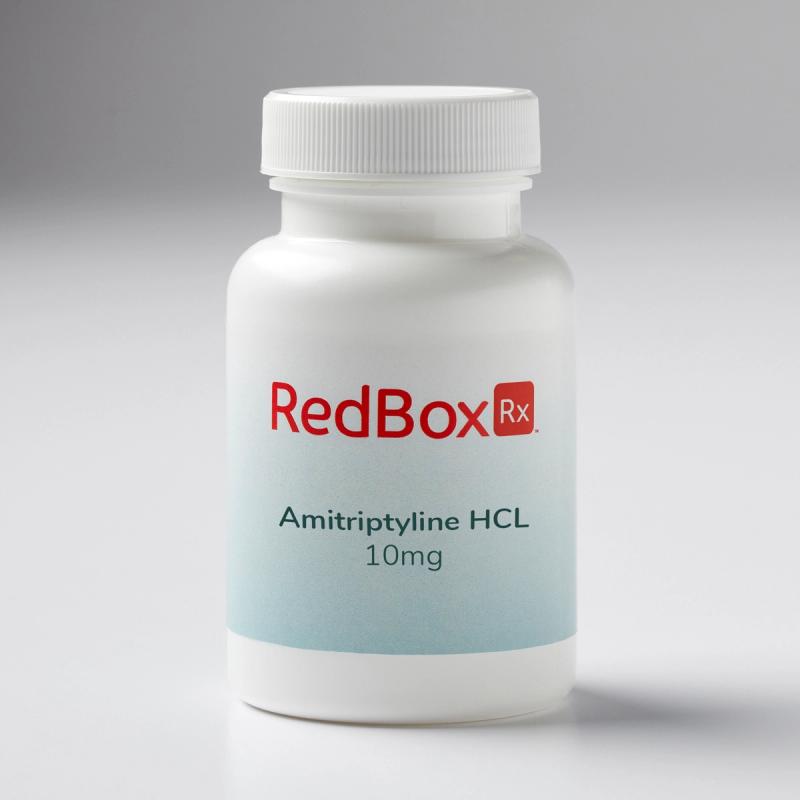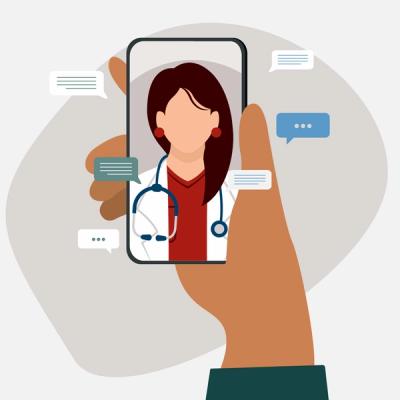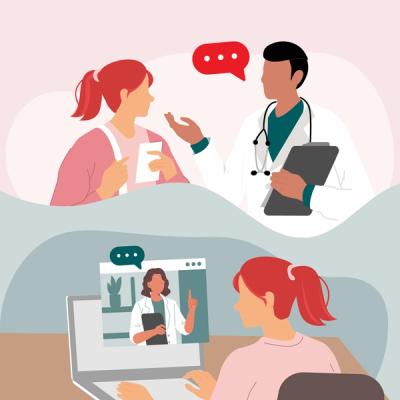Amitriptyline HCL FAQs
-
Amitriptyline is typically used to treat symptoms of depression. It is also used to prevent migraine headaches and treat insomnia and sleep disorders. These are off-label uses of the medication. Amitriptyline is in a class of medications called tricyclic antidepressants.
-
Amitriptyline comes as a tablet to take by mouth. Follow the directions on your prescription label carefully, and ask your doctor or pharmacist to explain any part you do not understand. Take amitriptyline exactly as directed. Do not take more or less of it or take it more often than prescribed by your doctor.
It may take a few weeks or longer before you feel the full benefit of amitriptyline. Continue to take amitriptyline even if you feel well. Do not stop taking amitriptyline without talking to your doctor. If you suddenly stop taking amitriptyline, you may experience withdrawal symptoms such as nausea, headache, and lack of energy. Your doctor will probably decrease your dose gradually.
-
Before taking amitriptyline,
tell your doctor and pharmacist if you are allergic to amitriptyline or any other medications.
tell your doctor if you are taking cisapride (Propulsid) (not available in the U.S.) or monoamine oxidase (MAO) inhibitors such as isocarboxazid (Marplan), phenelzine (Nardil), selegiline (Eldepryl, Emsam, Zelapar), and tranylcypromine (Parnate), or if you have taken an MAO inhibitor during the past 14 days. Your doctor will probably tell you that you should not take amitriptyline.
tell your doctor and pharmacist what other prescription and nonprescription medications, vitamins, nutritional supplements, and herbal products you are taking. Be sure to mention any of the following: antihistamines; cimetidine (Tagamet); diet pills; disulfiram (Antabuse); guanethidine (Ismelin); ipratropium (Atrovent); quinidine (Quinidex); medications for irregular heartbeats such as flecainide (Tambocor) and propafenone (Rythmol); medications for anxiety, asthma, colds, irritable bowel disease, mental illness, nausea, Parkinson's disease, seizures, ulcers, or urinary problems; other antidepressants; phenobarbital (Bellatal, Solfoton); sedatives; selective serotonin reuptake inhibitors (SSRIs) such as citalopram (Celexa), fluoxetine (Prozac, Sarafem), fluvoxamine (Luvox), paroxetine (Paxil), and sertraline (Zoloft); sleeping pills; thyroid medications; and tranquilizers. Tell your doctor or pharmacist if you have stopped taking fluoxetine (Prozac, Sarafem) in the past 5 weeks.Your doctor may need to change the doses of your medications or monitor you carefully for side effects.
tell your doctor if you have recently had a heart attack. Your doctor will probably tell you not to take amitriptyline.
tell your doctor if you drink large amounts of alcohol and if you have or have ever had glaucoma (an eye condition); an enlarged prostate (a male reproductive gland); difficulty urinating; seizures; an overactive thyroid gland (hyperthyroidism); diabetes; schizophrenia (a mental illness that causes disturbed or unusual thinking, loss of interest in life, and strong or inappropriate emotions); or liver, kidney, or heart disease.
tell your doctor if you are pregnant or plan to become pregnant. If you become pregnant while taking amitriptyline, call your doctor. Do not breast-feed while you are taking amitriptyline.
talk to your doctor about the risks and benefits of taking this medication if you are 65 years of age or older. Older adults should not usually take amitriptyline because it is not as safe or effective as other medication(s) that can be used to treat the same condition.
if you are having surgery, including dental surgery, tell the doctor or dentist that you are taking amitriptyline.
you should know that amitriptyline may make you drowsy. Do not drive a car or operate machinery until you know how this medication affects you.
remember that alcohol can add to the drowsiness caused by this medication.
-
Unless your doctor tells you otherwise, continue your normal diet.
-
Take the missed dose as soon as you remember it. However, if it is almost time for the next dose, skip the missed dose and continue your regular dosing schedule. Do not take a double dose to make up for a missed one.
-
Amitriptyline may cause side effects. Tell your doctor if any of these symptoms are severe or do not go away:
nausea
vomiting
drowsiness
weakness or tiredness
nightmares
headaches
dry mouth
constipation
difficulty urinating
blurred vision
pain, burning, or tingling in the hands or feet
changes in sex drive or ability
excessive sweating
changes in appetite or weight
confusion
unsteadiness
Some side effects can be serious. If you experience any of the following symptoms or those listed in the IMPORTANT WARNING section, call your doctor immediately:
slow or difficult speech
dizziness or faintness
weakness or numbness of an arm or a leg
crushing chest pain
rapid, pounding, or irregular heartbeat
severe skin rash or hives
swelling of the face and tongue
yellowing of the skin or eyes
jaw, neck, and back muscle spasms
uncontrollable shaking of a part of the body
fainting
unusual bleeding or bruising
seizures
hallucinating (seeing things or hearing voices that do not exist)
Amitriptyline may cause other side effects. Call your doctor if you have any unusual problems while taking this medication.
If you experience a serious side effect, you or your doctor may send a report to the Food and Drug Administration's (FDA) MedWatch Adverse Event Reporting program online (http://www.fda.gov/Safety/MedWatch) or by phone (1-800-332-1088).
-
Keep this medication in the container it came in, tightly closed, and out of reach of children. Store it at room temperature and away from excess heat and moisture (not in the bathroom).
Unneeded medications should be disposed of in special ways to ensure that pets, children, and other people cannot consume them. However, you should not flush this medication down the toilet. Instead, the best way to dispose of your medication is through a medicine take-back program. Talk to your pharmacist or contact your local garbage/recycling department to learn about take-back programs in your community. See the FDA's Safe Disposal of Medicines website (http://goo.gl/c4Rm4p) for more information if you do not have access to a take-back program.
It is important to keep all medication out of sight and reach of children as many containers (such as weekly pill minders and those for eye drops, creams, patches, and inhalers) are not child-resistant and young children can open them easily. To protect young children from poisoning, always lock safety caps and immediately place the medication in a safe location - one that is up and away and out of their sight and reach. http://www.upandaway.org
-
In case of overdose, call the poison control helpline at 1-800-222-1222. Information is also available online at https://www.poisonhelp.org/help. If the victim has collapsed, had a seizure, has trouble breathing, or can't be awakened, immediately call emergency services at 911.
Symptoms of overdose may include:
irregular heartbeat
seizures
coma (loss of consciousness for a period of time)
confusion
problems concentrating
hallucinating (seeing things or hearing voices that do not exist)
agitation
drowsiness
rigid muscles
vomiting
fever
cold body temperature
-
Keep all appointments with your doctor and the laboratory. Your doctor may order certain lab tests to check your body's response to amitriptyline.
Do not let anyone else take your medication. Ask your pharmacist any questions you have about refilling your prescription.
It is important for you to keep a written list of all of the prescription and nonprescription (over-the-counter) medicines you are taking, as well as any products such as vitamins, minerals, or other dietary supplements. You should bring this list with you each time you visit a doctor or if you are admitted to a hospital. It is also important information to carry with you in case of emergencies.
-
Elavil®
-
A small number of young adults (up to 24 years of age) who took antidepressants ('mood elevators') such as amitriptyline during clinical studies became suicidal (thinking about harming or killing oneself or planning or trying to do so). Young adults who take antidepressants to treat depression or other mental illnesses may be more likely to become suicidal than young adults who do not take antidepressants to treat these conditions. However, experts are not sure about how great this risk is and how much it should be considered in deciding whether a child or teenager should take an antidepressant. You should know that your mental health may change in unexpected ways when you take amitriptyline or other antidepressants even if you are an adult over age 24. You may become suicidal, especially at the beginning of your treatment and any time that your dose is increased or decreased. You, your family, or your caregiver should call your doctor right away if you experience any of the following symptoms: new or worsening depression; thinking about harming or killing yourself, or planning or trying to do so; extreme worry; agitation; panic attacks; difficulty falling asleep or staying asleep; aggressive behavior; irritability; acting without thinking; severe restlessness; and frenzied abnormal excitement. Be sure that your family or caregiver knows which symptoms may be serious so they can call the doctor when you are unable to seek treatment on your own.
Your healthcare provider will want to see you often while you are taking amitriptyline, especially at the beginning of your treatment. Be sure to keep all appointments for office visits with your doctor.
The doctor or pharmacist will give you the manufacturer's patient information sheet (Medication Guide) when you begin treatment with amitriptyline. Read the information carefully and ask your doctor or pharmacist if you have any questions. You also can obtain the Medication Guide from the FDA website: http://www.fda.gov/Drugs/DrugSafety/ucm085729.htm.
No matter your age, before you take an antidepressant, you, your parent, or your caregiver should talk to your doctor about the risks and benefits of treating your condition with an antidepressant or with other treatments. You should also talk about the risks and benefits of not treating your condition. You should know that having depression or another mental illness greatly increases the risk that you will become suicidal. This risk is higher if you or anyone in your family has or has ever had bipolar disorder (mood that changes from depressed to abnormally excited) or mania (frenzied, abnormally excited mood) or has thought about or attempted suicide. Talk to your doctor about your condition, symptoms, and personal and family medical history. You and your doctor will decide what type of treatment is right for you.
-
We offer a variety of prescription medication options for migraines and headaches including:
-
We also prescribe the following medication for insomnia:

Affordable migraine and insomnia treatment online.
Whether you are looking for preventative treatment of migraines or help with insomnia, RedBox Rx offers FDA-approved prescription medications to get you feeling like yourself again. Your first step towards relief is to start an online consultation with one of our experienced, licensed medical providers.
- No membership or subscription fees.
- Low-cost telehealth consult with a licensed medical provider.
- Amitriptyline HCL for $20 per month.
- Confidential, private and secure.
- Free standard shipping or expedited/overnight available.
Sorry, we’re closed for today. Our U.S. licensed medical providers are available daily 7 a.m. to 9 p.m. CST via live video visit. We look forward to serving you soon. Email us anytime at [email protected].
How RedBox Rx Works
What Our Patients Are Saying
-
“
They made service quick and easy to use. The health information that you complete wasn’t horrible and they did request recent lab work. I completed the information Monday and received my migraine medication on Thurs!
Heather S.
-
“
First time I used RedBox Rx and completely satisfied! I filled out the online consultation which was very thorough and that impressed me. Then less than 24 hours later I had an approval from a doctor for migraine medicine. Having no insurance at this time, this was easy and safe. I will use RedBox Rx again.
Constance W.
-
“
I can't believe the quality of care, not to mention how easy the site is to use! It is by far the best site I've found so far! Thank you RedBox Rx.
Laura K.

Get amitriptyline prescribed online.
Take a 5-minute online assessment, then one of our experienced, licensed medical providers will review and determine whether amitriptyline or another medication is right for you.
Sorry, we’re closed for today. Our U.S. licensed medical providers are available daily 7 a.m. to 9 p.m. CST via live video visit. We look forward to serving you soon. Email us anytime at [email protected].





